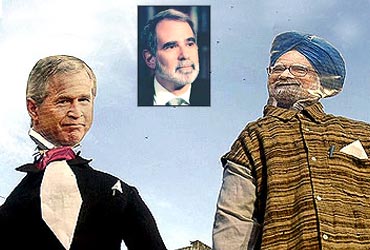
Prior to co-founding the Stimson Centre, Krepon worked at the Carnegie Endowment for International Peace, the US Arms Control and Disarmament Agency during the Jimmy Carter administration, and in the US House of Representatives, assisting Congressman Norm Dicks.
Krepon, who divides his time between Stimson's South Asia and space security projects, spoke to Rediff.com contributor Kanchana Suggu about President Obama's visit to India.
There are expectations from India and potentially from the United States as well regarding the outcome of President Obama's visit. In your opinion, are these expectations aligned?
I think the frustrations are aligned, I don't know about the expectations. The United States has great frustration with the Indian bureaucracy. I understand Indians also have great frustration with Indian bureaucracy, but it is very hard to change patterns of behaviour from the past even though the situation today is so much different from the Cold War.
Americans have moved on. We are ready to work with India in partnership in many different areas. We are ready for a closer relationship.
We are ready to sell you combat aircraft. We are ready to work with your navy to help you protect the sea lines of communication around India. We are ready to trade with you, big time.
We are ready to accept your strategic autonomy, we understand that.
But a lot of people in India are not ready to move on. You are still concerned that any defence deal with the United States will constrain your strategic autonomy, as if the United States had the power to do that.

The (George W Bush) administration bent over backwards to change the rules of nuclear commerce for India's benefit and in return your Parliament shut out US firms from the competition.
So there are frustrations on the US side. There are also frustrations on the Indian side.
India wants technology transfers in several areas and has had great difficulty in getting the United States to change rules other than with respect to nuclear commerce. I understand that, that's a frustration.
The government of India has to be as confused about American politics as the government of the United States is about Indian politics.
Democracies are complex entities. So there are lots of misunderstandings and there are a lot of frustrations on both sides.
The important symbolism for me of the Obama visit is that it clarifies that which ever party is in power in the United States, whichever coalition government is in power in India, this relationship is on a stronger footing than before and it will survive various bumps in the road and move on.
So I think that's the primary, that's the headline for me.
Doesn't matter if it's Bush or Obama, these guys couldn't be different. But they both feel the same way about India and about the US-Indian relationship.
ALSO SEE: Complete coverage: Obama in India
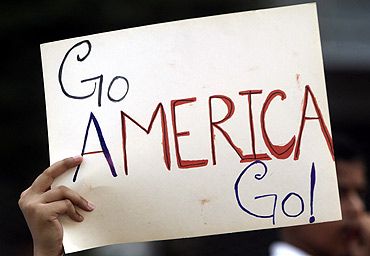
Well, it's a lot easier to strengthen the US relationship with India than it is to strengthen the US relationship with Pakistan.
The US relationship with Pakistan is beset with so many different problems, severe problems, which we try and deal with as best we can.

Nobody who matters in the United States wants to cut ties with Pakistan because of all of the problems we have there. It's an important country, if it goes badly off the rails, then India will suffer greatly even more than it has today.
So we're going to try and manage the relationship with Pakistan the best we can, whether it's Bush, whether it's Obama.
The bilateral relationship with India is on a completely different plane. It's not a matter of managing terrible difficulties, because we don't have terrible difficulties. You know complaints about trade, it's a complaint; it's not a terrible difficulty.
Complaints about technology transfers, it's a complaint, it's not a huge difficulty in our relationship. So there's much more scope for far better relations into the future in US-Indian relations.
So will we become like the United States and the UK? No. it's still going to be a prickly partnership because both countries have great sensitivities and neither one of us likes taking advice.
But that's okay, that's who we are and we can manage and we can grow the partnership, certainly we can grow trade, and I hope we can grow defence cooperation too. These are all achievable.
ALSO SEE: Complete coverage: Obama in India
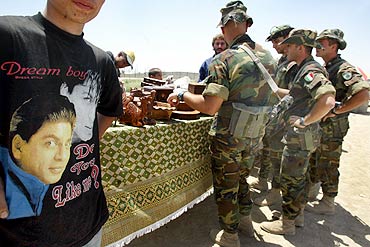
Which parties do you think should be included in these talks?

Nirupama, has taught me much when she was posted to Washington a while back -- I think she is younger than I am -- and so the democracy she hopes to see in Afghanistan may occur in her lifetime, but not in mine (laughs).
The Bush administration talked a lot about democracy in Afghanistan. I don't think you hear the Obama administration talking a lot about democracy in Afghanistan.
This is a country that has regrettably known a lot more violence than peace and it's such a long way from becoming a harmonious multi-ethnic society.
My goals are limited with respect to Afghanistan and I think the Obama administration feels the same way.
We understand there are fissures in the country that are not going to go away and that different ethnic groups and armed bands are going to play a role in the society.
What we would like, I think, is that they work out amongst themselves arrangements so that the country does not again revert to perpetual warfare.
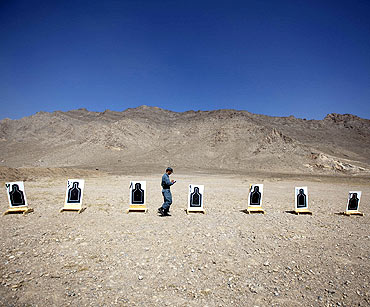
Does India have a role in this?
No, I'm not saying that. I think external parties actually do need to be part of a process of political settlement because if external parties are not excluded, then whatever settlement is arrived at is likely to be short-lived because some external party or another will want to change the settlement so that it seems to be more favourable.
So India does have a role in a political settlement in Afghanistan. Pakistan has a role.

I don't see how we can arrive at a political settlement by shutting out Pakistan, that's not going to work.
The United States has a role, other countries have roles. But it's going to be extremely difficult and probably tentative whatever the settlement is given the nature of Afghanistan.
I think the most important objective from a US perspective, maybe from an Indian perspective as well -- is that whatever settlement can be arrived at, if a settlement can be arrived at -- in Afghanistan, that Afghanistan not again become a place where groups with violent aspirations and long reach can plan their attacks.
I think that's the key for the United States and given the grievous injury that India has felt, I imagine there is a commonality of interest there.
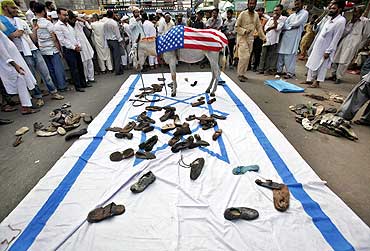
Is it true that the US is boosting Pakistan's naval capability when the Taliban are not known to have any naval forces?

Well, most of the US military support for Pakistan is now very connected to counter-terrorism applications. And if you look at the historic trends related to arms transfers to Pakistan, they are pretty clear.
Pakistan is becoming very, very dependent on China for arms transfers.
China is providing Pakistan with frontline fighter aircraft and with naval-related support far far more than the United States is. So keep your eye on Gwadar port.
That's a facility with potentially great ramifications, far more so than the provision by the United States to Pakistan of a maritime patrol aircraft. They are in totally different categories of strategic importance.
And the old line provisioners of the Pakistan army, air force and navy are being peeled off.
The US's role is much smaller than before, the French are pretty much unaffordable now. The Russians are not in the Pakistan arms market, which is a reflection of how strong the Russian-Indian arms transfer relationship is.
So it's becoming more and more China. That's the big picture.
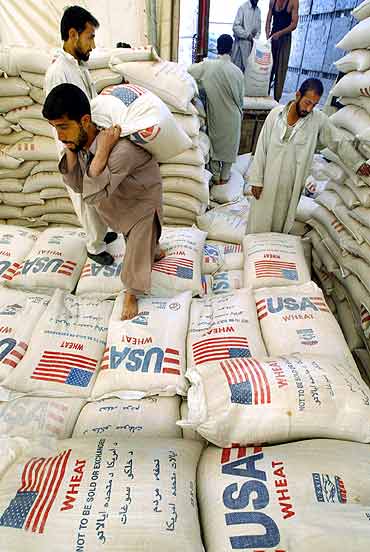

Given India's history with Pakistan, concerns are justified in India. I don't argue that, but I would ask the question: Would India be more concerned if the United States cut its ties with Pakistan?
So if you think that India's environment would be far worse if the United States cut its ties with Pakistan, far more detrimental to India, then ask yourself, how does the United States try to maintain good ties with Pakistan?
We are spending serious sums of money in Pakistan for non-military purposes, far more than we are spending on military purposes. Those are our priorities.
But I think in the view of the US administration, current, past and future, some military support will be part of the US-Pakistan equation.
This is the so-called Kerry-Lugar-Berman -- $7.5 billion over five years -- it's for education, social services, now disaster relief.
It's for all the things that the government of Pakistan does poorly for its people.

China is feeling its strength nowadays and it shows in various behaviour. So it shows in its relationship with Japan, it shows with its naval operations more and more distant from the Chinese mainland.
It shows with respect to mercantilist policies and withholding minerals that other countries need because China has cornered the market and is using trade as a weapon.
So China's feeling its oats, as we say, and India is on the receiving end, as well as other countries. These dam projects that China has pursued in Southeast Asia are very worrisome to the riparian states.

China is now engaged in dam building in ways that could affect India as well. I noticed that Chinese authorities withheld a visa from a senior Indian military officer because of his area of responsibility.
There are a lot of things, small and potentially large, that I am sure the Government of India is paying attention to.
Now, what role does the United States have to play here?
Well, it's a role as big or as small as India decides. We can't do more than what India wants us to do. But we could do somewhat less than what India wants us to.
Both the United States and India will pursue their own interests vis-a-vis China.
In the case of India, I think it is pretty clear -- at least from a distance -- that the Government of India would like normal relations with China, including delineated borders with China. But the Chinese are not so easy to deal with right now.
Earlier in the conversation, we were talking about old mindsets as being a real constraint on the relationship moving forward.
I am sure that if the US navy increased its presence in the Indian Ocean keeping in mind the need to signal China, many commentators in India would take offence. Not at China, but of the increased US presence in the Indian Ocean.
When the US navy makes a port call in an Indian port, are there 'Welcome US Navy banners' (laughs) displayed in the city?
This mindset, in my judgement, have not served bilateral relations very well and as China continues to rise, and at least for now rise more quickly than India, I think it's a good time to reassess these Cold War mindsets.